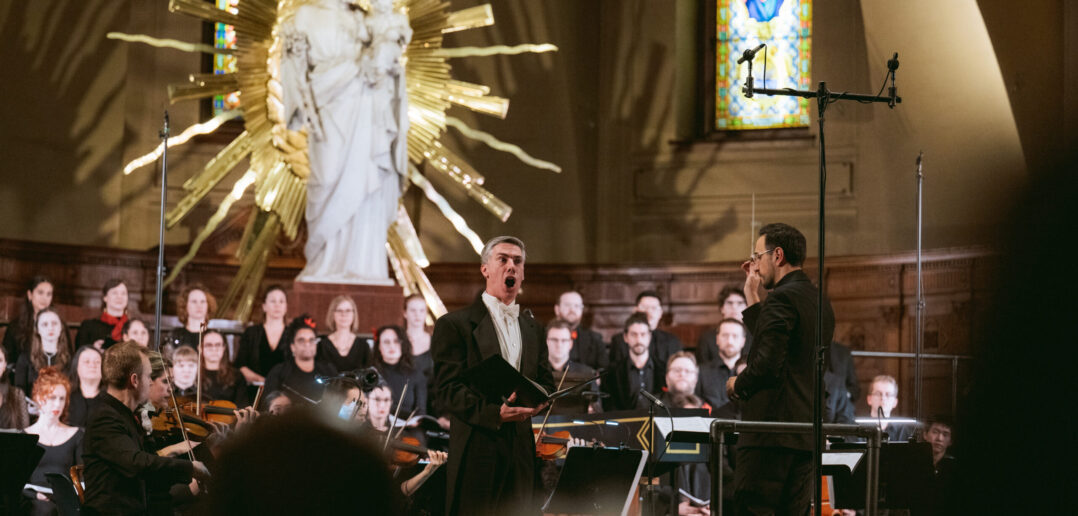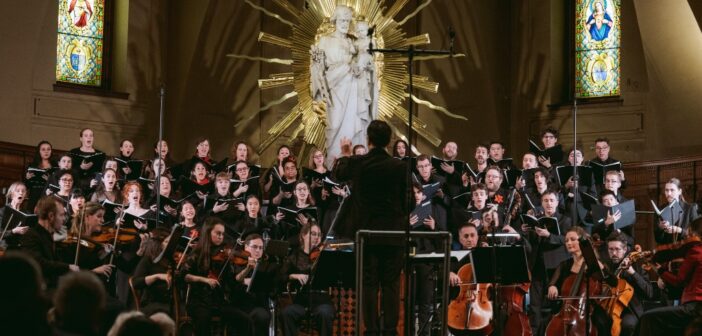As the holidays approach, George Frideric Handel’s Messiah begins to line concert programs around the world—and so, Orchestre classique de Montréal presents its annual performance of the great oratorio in one of the city’s most fitting venues: Saint Joseph’s Oratory. There, OCM, Filles de L’île women’s choir, Chantres Musiciens men’s choir, and four Canadian soloists presented 44 movements from the original piece under the baton of Israeli-French conductor Roï Azoulay.
Though originally written for Easter, the English oratorio has become synonymous with Christmas. It details the birth and death and resurrection of Jesus Christ despite the fact the majority of its texts are taken from the Bible’s Old Testament—a.k.a. the world before Jesus’ birth. It contains one of the most well-known pieces of choral music that even non-classical music lovers recognize: the distinctive “Hallelujah” chorus.
The glow of the candles and the elegant architecture of the crypt at the Oratory contributed to a warm and welcoming atmosphere for the grand event. Azoulay, who has won a Grammy and Juno Award for his work on Leonard Cohen’s last album, conducted the small orchestra of around 20 players with a relaxed ease.
Italian-Canadian tenor Angelo Moretti set the stage with “Comfort ye my people.” He easily scaled up and down its tricky intervallic jumps, demonstrating great breath control and text painting in “Every valley shall be exalted.” His enunciation was superb, his singing the most intelligible to me among the four soloists.

Phillip Addis (baritone soloist) with OCM. Photo: Tam Photography
Phillip Addis’ baritone voice was the most well-projected, resonating through the entire room. His powerful voice was well-suited to intense moments like “Why do the nations” and his subtle expressions projected his confidence. Though some of his notes in his ascending scales in thirds were not quite distinct enough, his arpeggios in “The trumpet shall sound” were much more assured and regal.
Mezzo-soprano Stéphanie Pothier sang with a slightly softer grained tone. It was difficult at times to hear her words, particularly in lower-lying sections of “But who may abide the day of his coming.” Nonetheless, she delivered a solid performance. Her intricate vocal embellishments paired with the harpsichord in true Baroque period style.
Lastly, soprano Magali Simard-Galdès shone in her solos, her clear voice ringing out like silver bells. Her stage presence was sweet and gentle. Like Moretti, her high intervallic jumps were precise and well-controlled, especially in the aria, “Rejoice greatly”. She used vibrato more sparingly than the other soloists, contributing to a less operatic, more period vocal style.
The 45 member choir responded enthusiastically to Azoulay’s direction. They were especially impressive in the stretto layerings of “Behold the Lamb of God.” At one point during the final “Worthy is the Lamb” chorus, it seemed as if a single tenor voice was significantly louder than the rest of the choir marring an otherwise admirable blend.
Gripes:
As per tradition, we all stood for the infamous “Hallelujah” chorus. OCM’s modest forces were actually more in keeping with period style and quite different from performances featuring hundreds of choristers. Yet for some reason I cannot quite place—perhaps a product of the church’s acoustics or the modest crescendo achieved by the ensemble; it did not feel as powerful as other versions I’ve experienced. Though it was still obviously an emotional moment for many audience members, it lacked a degree of triumph and the same could be said for the oratorio’s finale.
Furthermore, Pothier’s weighty “He was despised” was delivered at a rather idiosyncratic, almost cheerful and bouncy pace quite different from the Largo of the original score. There were also some prominent staccato accents in this section where more legato phrasing from Azoulay might have been more appropriate. As a result, Messiah’s longest aria came off less somber and mournful than the tragic story its text conveys.
Given its ubiquity every Christmas with orchestras and choirs of all different calibers, one might think Messiah gets repetitive. However, the OCM, Filles de L’île, Chantres Musiciens and the four soloists made a strong impression. All the performers’ enthusiasm radiated throughout the church, reminding us why Handel’s oratorio continues to resonate with audiences around the world, season after season.
Orchestre classique de Montréal’s season continues on Feb. 6 with “Distant Echoes of Africa”














